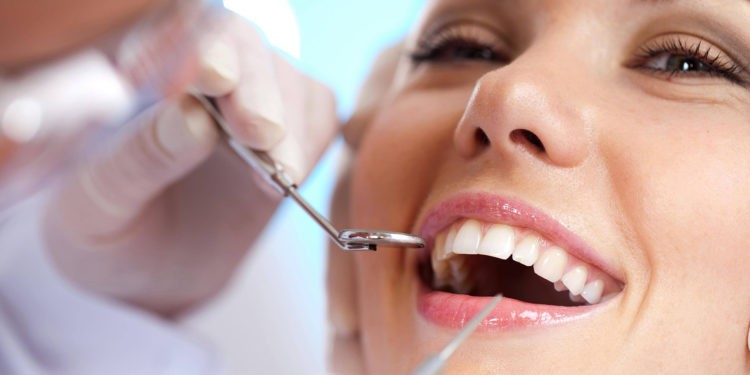Optimum Oral Health

Good oral health is not just about clean teeth and fresh breath. It’s so much more.
One ongoing humorous (but inherently serious!) sentiment regarding dental checkups notes, “You don’t have to brush all your teeth. Just the ones you want to keep!” In reality, that is the truth. However, good oral health is more than just healthy teeth and gums. Your mouth is the gateway to your overall health and well-being, so skipping out on routine dental visits could have a greater impact on your health than you might realize.
Establishing a regular professional relationship with a dentist is a good idea, but many people put off getting routine check-ups. In order to prevent oral health problems, regular dental visits are recommended. Unfortunately, more than a third of American adults do not see a visit every year. Failure to have routine dental examinations can lead to tooth decay and gum disease. Left untreated, cavities and gum disease can lead to tooth loss. But more than just helping you maintain a great smile, regular dental visits can alert your dentist to indicators about your overall health and whether or not you might be at risk for chronic disease. Research has indicated the health of your mouth mirrors the condition of your body as a whole. If your mouth is healthy, more than likely your overall health is good, too. However, if you have oral health issues, those may raise a red flag about other things going on in your body. Even further, studies have shown good oral health can actually prevent certain diseases from occurring.
If it has been awhile since you last saw a dentist, now might be a good time to make that appointment. You should especially see your dentist right away if you have bleeding gums or gums that have receded from your teeth; if any of your teeth are loose or separating; if you see red or white patches on your gums, tongue or the floor of your mouth; if you have sores in your mouth that fail to heal; if you experience persistent mouth or jaw pain; or if you have any difficulty with chewing or swallowing.

Of course, there are multiple reasons why you should schedule regular dental checkups. First and foremost: oral cancer detection. An extremely serious disease that can manifest in many ways, oral cancer often remains undiagnosed and can quickly progress, becoming life threatening. If caught early, however, the disease is often treatable.
Then there is the issue of plaque. Most of us probably have it. Even if we are diligent with daily brushing and flossing, it is easy to miss certain areas in your mouth. When plaque builds up, it becomes increasingly difficult to remove and can then solidify and turn into tartar. Without professional help, tartar is extremely difficult to remove. With a regular dental cleaning, your dentist can keep tartar from eroding your teeth or creating holes in them. Those holes translate to cavities. Remember this, as well. A cleaning appointment is less expensive than getting a cavity filled.
Also, if you have any bad habits (many of us do!), those can contribute to poor oral health. If you chew ice, bite your nails, clench your jaw, grind your teeth, eat hard or sticky sweets, drink coffee and/or red wine, smoke or even brush your teeth too vigorously, these are habits that can have an adverse effect on your overall oral health.
Then there is the issue of gum disease, which comes with certain health complications. According to the Academy of General Dentistry, there is a relationship between periodontal (gum) disease and health, including stroke and heart disease. For women with gum disease, studies have shown higher incidences of pre-term, low birth-weight babies. Additional studies have concluded more than 90% of all systemic diseases – those that involve many organs or the entire body – have oral manifestations which can come in the form of swollen gums, mouth ulcers, dry mouth and excessive gum problems. Among such diseases are diabetes, leukemia, oral cancer, pancreatic cancer, heart disease, and kidney disease. Therefore, a regular oral examination by a dentist may reveal a problem in its early stages.
Other complications of poor oral health include oral and facial pain. The Office of the Surgeon General has reported this pain can largely be attributed to infection of the gums that support the teeth and can lead to tooth loss. An early stage of gum disease known as gingivitis, along with advanced gum disease, affect in excess of 75% of the U.S. population. Infections in the mouth can also affect major organs. The heart and heart valves can become inflamed by bacterial endocarditis. Poor oral health can also lead to digestion issues which can ultimately lead to intestinal failure, irritable bowel syndrome (IBS) and other digestive issues.
So, it is not just about having a beautiful smile and pretty teeth. Seeing a dentist on a regular basis is your first line of defense for other potential health issues. Routine visits to a dentist help to keep your mouth in great shape. Plus, your dentist can keep an eye on developments that could signal bigger health issues.
To get a head start at home, a few good habits to incorporate into your daily oral hygiene routine include brushing twice a day for at least two minutes with a fluoridated toothpaste; flossing daily to help remove plaque form places your toothbrush cannot reach; eating a healthy diet; avoiding cigarettes and smokeless tobacco; and scheduling those highly-recommended regular dental exams.
Sources: 123dentist.com, deltadentalins.com, oralhealth.deltadental.com






